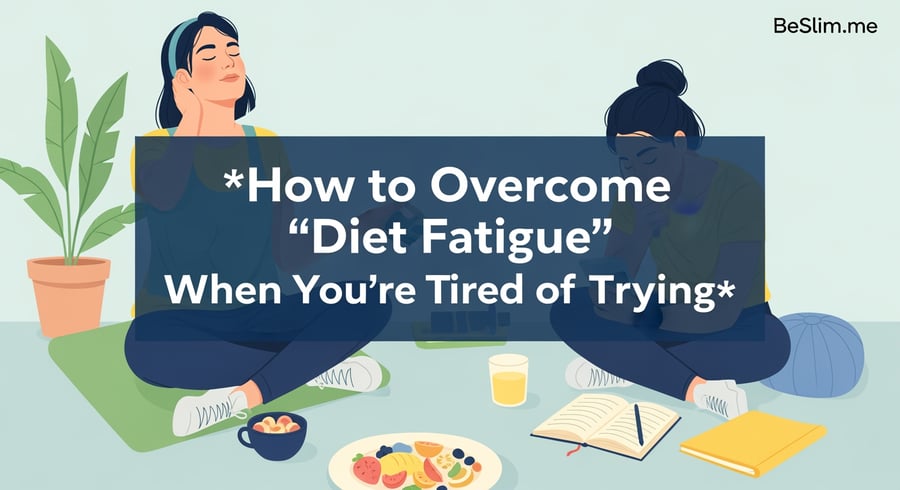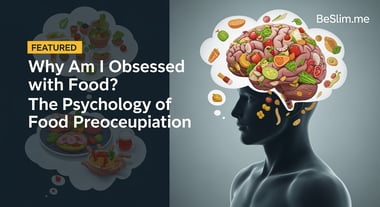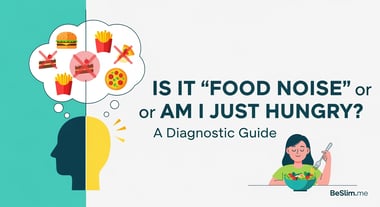Hello, I'm Master Kim, your Behavioral Psychologist and Solution Consultant at BeSlim.me. If you're feeling exhausted from endless dieting cycles—starting strong, hitting a wall, and wondering if you'll ever break free—this guide is for you. As someone who's helped countless individuals navigate these mental hurdles, I want to start by saying: You're not alone in this struggle. Diet fatigue is a completely normal response to the ups and downs of weight loss efforts. It's not a sign of weakness; it's your mind and body signaling for a more compassionate, sustainable approach. In this Q&A-style guide, we'll explore why this happens and provide practical steps to reignite your motivation. Let's dive in with empathy and evidence-based strategies.
Why Does Diet Fatigue Happen?
Diet fatigue often feels like hitting an invisible wall where enthusiasm fades, and even simple healthy choices seem overwhelming. But why does this occur? From a behavioral psychology perspective, it's rooted in a mix of psychological, hormonal, and habitual factors. Let's break it down accessibly, drawing on scientific insights to help you understand—and ultimately overcome—it.
At its core, diet fatigue stems from willpower depletion, a concept popularized in behavioral science as "ego depletion." This theory suggests that self-control is like a muscle that tires out with overuse. When you're constantly restricting foods, tracking calories, or resisting temptations, your mental resources get drained, leading to burnout. For instance, if you've been on a strict regimen for weeks, your brain's prefrontal cortex—the area responsible for decision-making and impulse control—becomes fatigued, making it harder to stick with your plan. Research supports this: studies on ego depletion show that repeated acts of self-control can reduce motivation over time, often resulting in what feels like an emotional slump.
Hormonally, chronic dieting can disrupt your body's stress response. When you're in a prolonged calorie deficit or facing the stress of lifestyle changes, your body ramps up cortisol production—the "stress hormone." Elevated cortisol not only increases cravings for comfort foods (think sugary or fatty snacks) but also contributes to fatigue by interfering with sleep and energy levels. This creates a vicious cycle: stress from dieting leads to emotional eating, which then heightens guilt and exhaustion. According to research from the National Institutes of Health on cortisol and appetite, this hormonal shift explains why many people experience "diet burnout" after initial weight loss success.
Behaviorally, diet fatigue ties into habit loops, as described by psychologist Charles Duhigg in his work on habit formation. Diets often rely on breaking old habits without building strong new ones, leading to relapse when motivation wanes. If your routine feels punitive rather than rewarding, your brain's reward system (involving dopamine) doesn't get the reinforcement it needs, making sustained effort feel draining. For example, if healthy eating is framed as a chore rather than a self-care act, the loop breaks down. This is compounded by decision fatigue, where the constant choices (e.g., "What should I eat for lunch?") overwhelm your cognitive bandwidth.
In essence, diet fatigue isn't just laziness—it's a scientifically backed response to unsustainable demands on your mind and body. Understanding this removes self-blame and opens the door to gentler, more effective strategies. If you've ever wondered, "Why can't I just push through?" the answer lies in respecting these natural limits rather than fighting them.
How Can I Overcome Diet Fatigue?
The good news is that diet fatigue is reversible with targeted behavioral shifts. Drawing from cognitive behavioral therapy (CBT) principles and habit science, here are five practical, step-by-step strategies you can implement right away. Each focuses on sustainable change, rebuilding your mental resilience without relying on sheer willpower. I'll include real-life examples to show how they work in practice.
Strategy 1: Reframe Your Goals with Micro-Habits
Instead of overwhelming yourself with big, vague goals like "lose 20 pounds," break them into tiny, achievable micro-habits that build momentum without draining your energy. This leverages the psychological principle of "small wins," which boosts dopamine and reduces fatigue by creating a sense of progress.
- Step 1: Identify one small habit tied to your larger goal, such as drinking a glass of water before meals instead of overhauling your entire diet.
- Step 2: Track it daily using a simple app or journal, celebrating each completion with a non-food reward, like a short walk or favorite podcast.
- Step 3: Gradually layer on another micro-habit once the first feels automatic, ensuring you don't overload yourself.
For example, Sarah, a busy mom I consulted, was fatigued from failed diets. She started with just adding veggies to one meal a day. Within two weeks, this small win reignited her energy, leading to broader changes without burnout. Research from Mayo Clinic on habit formation and weight management highlights how such incremental steps lead to long-term success by minimizing willpower depletion.
Strategy 2: Incorporate Mindful Breaks to Recharge Willpower
To combat ego depletion, schedule intentional "recharge periods" where you ease up on restrictions. This isn't about quitting—it's about strategic rest to restore mental resources, much like interval training for your brain.
- Step 1: Plan a weekly "flex day" where you allow moderate indulgences without guilt, focusing on enjoyment rather than perfection.
- Step 2: During the day, practice mindfulness techniques, like a 5-minute breathing exercise, to lower cortisol and reset your stress response.
- Step 3: Reflect afterward: Journal what felt restorative and adjust for the next time, building self-compassion.
Imagine John, who felt defeated after months of rigid tracking. By introducing a Sunday flex day with his favorite treat, he reduced his overall fatigue and returned to his routine refreshed. This approach aligns with findings that periodic breaks enhance adherence.
Strategy 3: Address Emotional Triggers with Journaling
Diet fatigue often masks underlying emotional eating triggered by stress. Use journaling to uncover and disrupt these patterns, fostering awareness and alternative coping mechanisms.
- Step 1: Keep a daily log of meals, moods, and triggers—note when fatigue spikes and what emotions (e.g., boredom, anxiety) precede it.
- Step 2: For each trigger, brainstorm non-food responses, like calling a friend or taking a nature walk.
- Step 3: Review weekly to spot patterns and celebrate progress, reinforcing positive habit loops.
Take Lisa's case: She discovered her evening snacking stemmed from work stress. By journaling and swapping snacks for herbal tea and reading, she broke the cycle, feeling more energized. This ties into CBT techniques for emotional regulation.
Strategy 4: Build a Support Network for Accountability
Isolation amplifies fatigue, so enlist social support to share the mental load. Behavioral science shows that accountability partners increase success rates by providing external motivation when internal drive dips.
- Step 1: Join a community, like an online forum or BeSlim.me group, where you can share wins and setbacks without judgment.
- Step 2: Set up weekly check-ins with a friend or coach to discuss progress and brainstorm solutions.
- Step 3: Use apps for virtual accountability, tracking shared goals to make the process feel collaborative.
For instance, Mike overcame his fatigue by partnering with a workout buddy. Their mutual encouragement turned solo struggles into shared victories, sustaining his efforts.
Strategy 5: Optimize Your Environment for Effortless Choices
Redesign your surroundings to minimize decision fatigue, making healthy choices the path of least resistance. This "choice architecture" from behavioral economics reduces the cognitive effort needed for good habits.
- Step 1: Prep your kitchen by placing healthy options (e.g., cut fruits) front and center, hiding temptations.
- Step 2: Automate routines, like meal prepping on Sundays, to eliminate daily decisions.
- Step 3: Create cues, such as setting phone reminders for hydration, to nudge behaviors without relying on willpower.
Emily, exhausted from constant choices, transformed her pantry and saw her fatigue drop as healthy eating became automatic. This environmental tweak supports long-term sustainability.
Final Encouragement: Change Is Within Reach
Remember, overcoming diet fatigue isn't about forcing yourself harder—it's about working smarter with your mind and body's natural rhythms. You've already taken the first step by seeking this guidance, and with these strategies, sustainable progress is not just possible; it's probable. Be patient with yourself, celebrate small victories, and know that every setback is a learning opportunity. At BeSlim.me, we're here to support you every step of the way. You've got this—let's turn fatigue into fuel for lasting change.
References
- Studies on ego depletion show that repeated acts of self-control can reduce motivation over time - pubmed.ncbi.nlm.nih.gov
- Research from the National Institutes of Health on cortisol and appetite - niddk.nih.gov
- Mayo Clinic on habit formation and weight management - mayoclinic.org
Medical Disclaimer
The content on this website is for informational and educational purposes only. It is not intended as medical advice and should not be relied upon as a substitute for consultations with qualified healthcare professionals who are familiar with your individual medical needs. Always seek the advice of your physician or other qualified healthcare provider with any questions you may have regarding a medical condition. Never disregard professional medical advice or delay in seeking it because of something you have read on this website.




